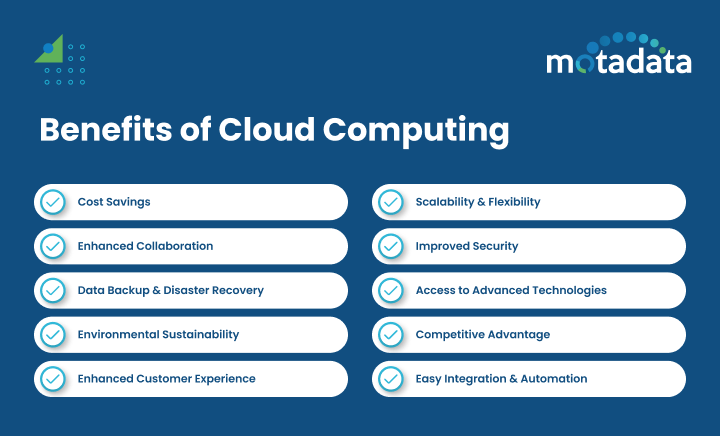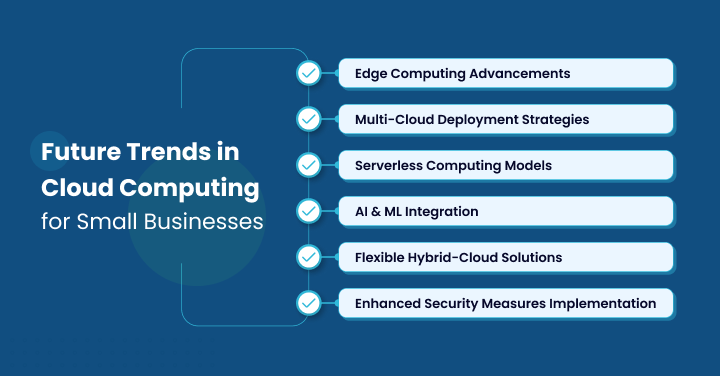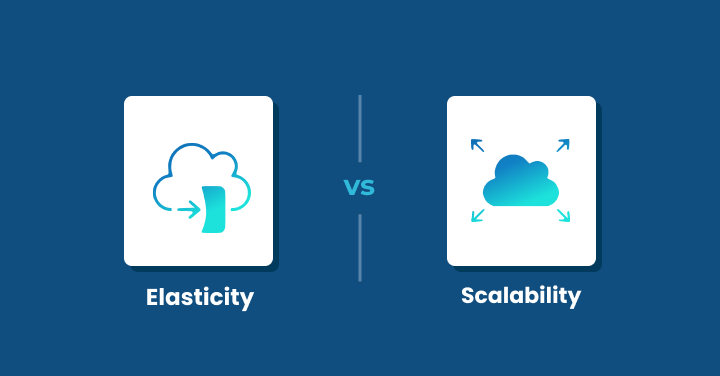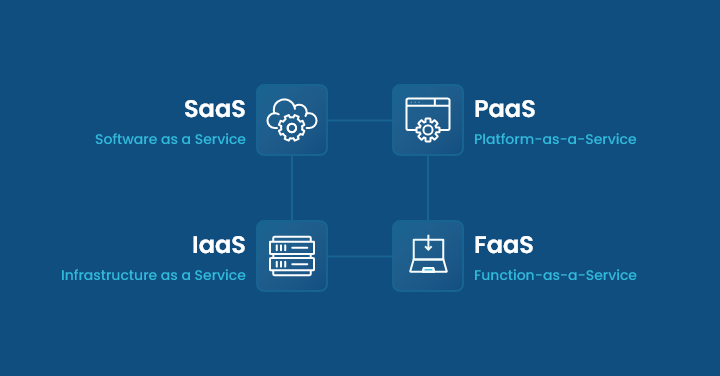Small businesses face unique challenges and opportunities in today’s rapidly evolving digital landscape.
The foremost revolutionary technology that small businesses can adopt is cloud computing.
This technique aims to provide numerous services through the Internet and has several advantages, including the possibility of boosting efficiency, decreasing costs, and improving the performance of a business organization.
This blog post will focus on several advantages of cloud computing, including public cloud and private cloud, for small businesses and will present a way to promote change.
How Can Cloud Computing Transform Small Businesses and Drive Growth?
Small businesses can access enterprise-level services such as data or object storage and sharing, information analysis, online sale facilities, and market necessities, adaptation at a much lower cost than large-scale investments, providing the growth and flexibility required in a highly competitive and fluctuating market.
Benefits of Cloud Computing
1. Cost Savings
Perhaps the most influential factor in why this small business should embrace cloud storage is realizing the cost advantage.
New-generation IT infrastructure has a lot of sensitive data and thus demands huge capital investments in equipment, software development, and their keeping.
Instead, it uses the rather efficient service model of cloud computing, where the company only pays for the resources it consumes.
For example, with cloud calling, calls are routed via the provider’s network using IP phones or softphones, offering reliable and scalable communication without the need for expensive hardware.
It also does away with large capital investments in vital cloud infrastructure for both public cloud services and private cloud services, lessening these firms’ capital intensity.
Moreover, cloud service providers take responsibility for maintaining, upgrading, and protecting underlying infrastructures; hence, SMEs do not need to employ more IT staff, spend money on maintenance, or provide better services to their end users.
This is especially appealing for organizations with lean pockets and those that work with physical servers since they can tap into sophisticated solutions without straining their purses. Many businesses are finding that partnering with providers of IT support for small business in London can make this transition to cloud services smoother and more cost-effective, while ensuring expert guidance throughout the process.
2. Scalability and Flexibility
A major advantage that cloud infrastructure services offer is easily scalable and flexible usage.
Demand is highly variable in small businesses, and it can be efficient to have the opportunity to add the supply of IT resources or reduce it if necessary.
Cloud application development and support services are designed in such a way that they can provide the facility to add or remove resources at any given instance; one can be sure that a business can handle all the loads it is most likely to encounter without overloading it to avoid paying for the likelihood.
This also applies to the use of software and storage, with the requirement increasing as the size of the program or data increases.
With this kind of system, as the business evolves, it can simply acquire more users, storage, and applications without having to invest literally in more equipment.
This benefit of flexibility helps small businesses stay ahead and meet the dynamic market and customers’ demands more effectively than competitors.
3. Enhanced Collaboration
Cloud computing improves the productivity of the IT teams within the organization and team members in and out of the office environment.
With cloud-based tools and applications, several employees can access, edit, or work on documents and projects simultaneously without any data loss.
This capability is valuable to small businesses that implement the SaaS model and with employees from remote locations or different branches since these people will certainly be in unison with the rest of the team and be able to contribute their efforts fully.
In addition, other forms of communication facilitated by the cloud include video conferencing and instant messaging, which enhance teamwork.
The cloud is an ideal way of mitigating issues affecting employee collaboration, hence enhancing productivity by formulating effective and efficient decisions that would foster business growth.
4. Improved Security
It is widely understood that businesses, including small ones, cannot ignore security concerns and must implement profound regulatory compliance.
A preferred type of cloud computing is characterized by high levels of security that protect special data and continued business operations.
Cloud-based service providers’ security measures include encryption methods, firewalls, passwords that guarantee data protection from relevant threats, and astute deployment models.
Moreover, cloud security is frequently the responsibility of cloud-based service providers, who constantly observe potential threats with the help of their security teams. To further enhance their capabilities and ensure a seamless transition, many businesses opt to use cloud migration services, which specialize in safely moving data, applications, and workflows to the cloud while maintaining the highest security standards.
This level of security can hardly be afforded by most small businesses that lack resources in the IT department.
This way, small businesses leverage enterprise-level security, but they do not need to cough out large sums of money for it.
5. Data Backup and Disaster Recovery
Missing information can be fatal to many small companies.
Most conventional approaches to making backups have limitations since they can be damaged, stolen, or affected by disasters like fires.
As for the drawbacks of computing, cloud computing is a more efficient and effective solution for data backup and disaster recovery.
System backups occur on their own at appointed intervals, and the data is kept in different physical data centers in different geographical regions.
It helps to avoid data duplication and guarantees the highest protection of information and its availability for recovery in case of a tragedy.
Small businesses need to be confident that their important information is safe and can be easily restored, and this will help prevent business interruptions.
6. Access to Advanced Technologies
Cloud computing offers smaller businesses access to sophisticated technologies that are otherwise only accessible to huge organizations.
Technology is now beneficial to small businesses since it can incorporate tools and applications that harness artificial intelligence (AI), machine learning (ML), and big data analytics to provide insights that can enhance decision-making processes.
For instance, AI and ML as a service make it easier for small enterprises to incorporate automation, analytics, and customer engagements.
Big data analytics tools help organizations process huge amounts of data to look for patterns, consumer trends, and potential markets.
By applying these modern technologies, small businesses can maintain a competitive advantage over similar companies and contribute to the advancement of technologies in use.
7. Environmental Sustainability
Besides the organizational benefits, cloud computing also has social benefits, particularly in the conservation of the environment.
The previous IT infrastructures have been known to use a lot of energy and contribute to forming electronic waste.
While on-premise storage requires more energy, contributing more to the increased carbon footprint, cloud computing using offshore servers is more conserved with energy.
Cloud-based service providers manage big, efficient data centers to manage energy supply effectively and, more often, source energy from renewable sources.
Hence, small businesses are in a position to shift to cloud-based technology services and be more prosperous in environmental conservation.
This serves the world’s interest and may be profitable for a business and increase its appeal to customers who prefer preserving the environment.
8. Competitive Advantage
Implementing cloud computing can greatly help small businesses in terms of business competitiveness.
Thus, cloud-based solutions are beneficial for businesses as these allow for improving performance and efficiency and minimizing expenses.
This results in less fragmentation of resources in non-strategic activities, thus enabling the cloud vendors to direct the resources to significant business processes, like manufacturing, promoting and selling their products, or responding to their client’s complaints.
Moreover, it responds to the needs of the market and customers quickly since the business is a small business that adopted cloud-based technology.
Technology is known to be a vital component of commerce, ensuring that new solutions are produced more quickly and unveiled in the market as soon as possible.
This flexibility is essential in today’s rotary environment and equips the small business with the ability to counter the competition.
9. Enhanced Customer Experience
Customer experience is one of the most critical success factors in the contemporary business environment.
Thus, cloud computing may be useful in enhancing the clients’ experiences for small businesses by providing customized, prompt, and effective services.
Some examples of cloud computing applications include cloud-based customer relationship management (CRM) systems, which allow firms to manage all the aspects of their customers’ accounts, improving the relationship.
Additionally, platforms like Etsy and its alternatives enable small enterprises to create and host aesthetically pleasing and user-friendly online stores- either through cloud-based marketplaces or website-building solutions – all without the need for technical expertise.
Moreover, cloud-based E-Commerce solutions and other online marketing tools allow businesses to address customer service and deliver relevant messages.
With the help of these tools, small businesses may improve customer satisfaction and loyalty and, therefore, ensure their regular return and subsequent organic growth.
10. Easy Integration and Automation
It allows for easier integration of application software and the operations of some functions in small businesses.
Cloud integration allows companies to connect various applications, streamlining business processes.
For example, businesses can link accounting systems with CRM platforms to improve revenue forecasting and customer interactions.
Automating repetitive tasks like invoicing, payroll preparation, and inventory management helps machines take over mundane work, easing employees’ workloads and minimizing errors.
Using invoicing software, for example, can simplify the invoicing process, making it more efficient and less prone to mistakes.
This not only leads to time and cost reduction but also facilitates employees’ engagement in more important and added-value activities.
Overcoming Challenges and Maximizing Benefits
Small businesses face the following issues in their cloud adoption.
The major strategies include deciding on the right service provider, adequate and effective training, security and compliance measures, cost control, and business resilience.
By doing this, small businesses will be in a better position to implement cloud computing to increase organization, decrease expenses, and ultimately advance.
1. Identifying the Right Service Provider
The efficiency of cloud services depends mainly on the selection criteria of the small business when choosing the cloud-based service provider.
Some aspects that organizations should consider include The prices of cloud computing, the level of security, the flexibility, and the services offered by cloud computing.
Therefore, when choosing the communication provider, it is crucial to select the provider that meets a small business’s needs and acknowledges them.
2. Training and Support
For SMBs to get the most out of the cloud, they must train their people.
It may be useful to explain to staff about cloud-based tools and applications that they may encounter so that they will know how to use it effectively.
Different cloud providers extend training and support services, which is important in helping businesses adopt cloud services smoothly.
3. Data Privacy and Compliance
Security and compliance are always issues that need to be addressed when implementing different types of cloud computing.
Due to the uncertainties in cloud data reliability, smaller business entities need to verify and confirm that legal and professional specifications bind the chosen cloud service suppliers.
This entails the data protection laws and specific regulations that apply to their line of business.
While overall compliance of an organization may be thorny, recurring audits and assessments can assist it in preventing the leakage of important information.
4. Managing Costs
Hence, although cloud computing decreases costs in general, small businesses must control expenses in cloud services.
This is about keeping track of the obtainable resources, fine-tuning the bound services, and averting pointless spending.
Software and cloud platforms that can alert and inform about expenses and optimization can be useful when over-costs in the cloud are in view.
5. Ensuring Business Continuity
It is paramount for small business organizations to prepare for any form of disruption; that is why business continuity planning is vital.
Cloud computing is helpful for business continuity in that it can offer backup and disaster recovery services.
Small businesses need to have contingency plans, which should incorporate cloud strategies to enable them to continue running in emergencies.
Future Trends in Cloud Computing for Small Businesses
New tendencies in cloud technologies are expected to redefine small businesses.
Some of them are Real-time computing for data analysis, Non-hyper-scale cloud to mitigate vendor lock-in, Serverless structures to minimize operations, and AI and ML to boost decision-making.
Other trends will be hybrid-cloud solutions and improvements in security programs necessary for small businesses to remain viable contenders and secure in today’s digital environment.
1. Edge Computing Advancements
Edge computing has gained significant attention as it distributes computations and storage closer to where data is generated and processed.
This makes it unique because it cuts latency, making it better suitable for real-time end-use, especially by small businesses.
Edge computing thus has the potential to improve the usability of Internet of Things (IoT) devices and all other programs that require fast data.
2. Multi-Cloud Deployment Strategies
Most small business entities now use services offered by multiple clusters to address their various requirements, commonly called the multi-cloud model.
This approach enables flexibility, avoids vendor lock-in, and benefits an organization from both the clouds without compromising its capability.
Utilizing multiple cloud environments can improve business continuity and resource efficiency stewardship.
3. Serverless Computing Models
Serverless computing is becoming fashionable because it enables business applications and services to run on infrastructure a business does not control.
This model helps in cutting down on operational complications and expenses and it simply charges the client based on utilization.
Serverless computing is also preferred in small business establishments because the solutions are more flexible and less expensive.
4. Artificial Intelligence and Machine Learning Integration
Artificial Intelligence (AI) and Machine Learning (ML) as cloud service components are changing how small businesses work.
These big data technologies provide the power of analytics, the ability to automate jobs, and personalization.
Entrepreneurs can obtain information, enhance the flow of communication with clients, and optimize activities while increasing the competitiveness of businesses through the help of AI and ML.
5. Flexible Hybrid-Cloud Solutions
In the hybrid cloud model, companies use their private and public cloud services, giving the best services.
This approach is helpful for small businesses because it enables them to retain full control of certain key information and programs while garnering most of the advantages cloud computing offers.
The integrated solutions can fit a business environment and IT standards’ requirements.
6. Enhanced Security Measures Implementation
With the constant emergence of new cyber threats, CSPs anticipate improving the security of small businesses that use their services.
This covers issues like encryption, using second factors, and constant supervision.
The field-level and object-level locking offer small businesses enhanced security features protecting the data and the business operations, respectively.
Conclusion
Cloud computing holds many advantages that can revolutionize the sphere of activity of small businesses.
It offers everything regarding costs and scale, updated development tools, and new ways of communication and information security for small businesses to be successful in the modern economy.
Cloud services enable small businesses to innovate, work smarter, and ultimately, create excellent client experience.
Given that the global economy has shifted to the World Wide Web realm of operation, cloud computing has become a necessity for every small business in its bid to attain sustainable business growth and success.
However, with future technology planning in mind, businesses need to understand the full benefits of cloud technology and its potential options.
To achieve maximum returns, enterprises need to locate the appropriate cloud computing services to help them overcome barriers and boldly and proactively confront the challenges of the new environment.
Thus, the cloud is an avenue to better and prosperous future employment of such tools as better data management, advanced technologies, and collaboration.
FAQs:
Cloud computing refers to the delivery of computing services such as storage, processing power, and software over the internet (“the cloud”) on a pay-as-you-go basis.
Small businesses can benefit through reduced IT costs, scalability, enhanced collaboration, data security, and the ability to work remotely.
The three primary types are Infrastructure as a Service (IaaS), Platform as a Service (PaaS), and Software as a Service (SaaS), each serving different business needs.








